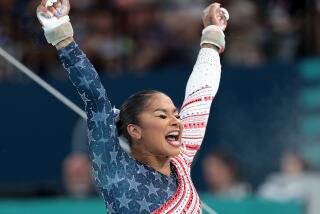IAAF Will Go to Court
- Share via
Setting the stage for action that could lead to the loss of U.S. Olympic gold medals, track and field’s world governing body expects to lodge a formal legal challenge to the move by a USA Track & Field panel that cleared sprinter Jerome Young to compete at the 2000 Sydney Olympics, two sources familiar with the matter said.
The International Assn. of Athletics Federations is set to announce as soon as this week that it plans to take the case to the Swiss-based Court of Arbitration for Sport, the sources said, speaking on condition of anonymity. A USATF appeal panel cleared Young to compete, though he had tested positive the year before for the banned steroid nandrolone.
The IAAF needs only a few more documents to complete what one source Tuesday called a “jigsaw puzzle” that the IAAF believes would lock in evidence making a case against Young. Typically, a steroid offense brings a two-year ban. Such a ban would have left Young ineligible for the 2000 Games.
At stake are the gold medals won by Young and five other Americans, including Michael Johnson, in the 1,600-meter relay at the Sydney Games. In modern Olympic history, according to the Amateur Athletic Foundation sports library in Los Angeles, only two Americans have received medals and then been ordered to give them back: Jim Thorpe (gold, decathlon, 1912) and Rick DeMont (gold, swimming, 1972).
Young tested positive June 26, 1999. A USATF hearing board initially found against him; then, just days before the 2000 Olympic trials, the USATF appeal board cleared him to compete. The hearing and appeal were conducted in secret, the athlete’s name was not released and USATF has declined to make any of its records available, citing confidentiality concerns. Young has said he never committed a doping offense.
The Times last Aug. 27 identified the athlete as Young. The U.S. Olympic Committee in September confirmed to the IOC that it was Young. The IOC launched a “disciplinary” commission; the matter is on the agenda for the next meeting of the IOC’s executive board, in late February in Athens.
USATF has fiercely defended -- to the IOC, IAAF and CAS -- the process by which the Young case was reviewed.
If the Swiss tribunal ruled for the IAAF, the IOC then would make its decision on the medals. A time frame is not set, and although CAS cases can sometimes take months, there is urgency for resolution of Young’s case before the Aug. 13 start of the Athens Olympics.
In a related matter, the USOC’s executive committee, meeting Tuesday in Chicago, reiterated a long-standing demand that USATF turn over its files in the case. At stake is about $3 million that flows annually from USOC to USATF, among other sanctions.
More to Read
Go beyond the scoreboard
Get the latest on L.A.'s teams in the daily Sports Report newsletter.
You may occasionally receive promotional content from the Los Angeles Times.





